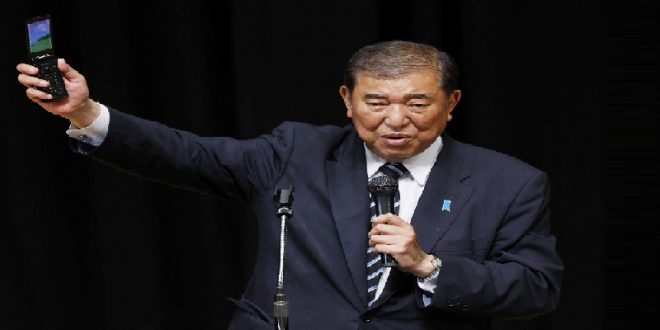27-10-2024
TOKYO: Japan’s voters could end more than a decade of Liberal Democratic Party dominance on Sunday, forcing the ruling party into power-sharing deals that could undermine the country’s leadership.
The general election, nine days before the US chooses a new president, adds uncertainty to an already turbulent geopolitical landscape as the Tokyo government faces growing tensions with neighboring China and inflation squeezes Japanese households.
 Prime Minister Shigeru Ishiba’s conservative LDP, in government for almost all of the postwar era, has had a majority in the lower house of parliament since 2012, ruling in coalition with Komeito, on which it depends to control the less-powerful upper house.
Prime Minister Shigeru Ishiba’s conservative LDP, in government for almost all of the postwar era, has had a majority in the lower house of parliament since 2012, ruling in coalition with Komeito, on which it depends to control the less-powerful upper house.
But discontent over an LDP political funding scandal and a rising cost of living in the world’s fourth-biggest economy threatens the ruling party.
“Public anger has not subsided. The election is going to be very close for the LDP,” said Tomoaki Iwai, professor emeritus at Nihon University and an expert on money in politics.
An opinion survey in the Asahi newspaper on Monday suggested the party could lose as many as 50 of its 247 seats in the lower chamber and Komeito could slip to fewer than 30, putting the coalition below the 233 needed for a majority.
The LDP will remain easily the biggest force in parliament, but many votes could go to the number two party, the opposition Constitutional Democratic Party of Japan, which toppled the LDP in 2009. The CDPJ could win 140 seats, the Asahi estimated.
If the LDP needs to rely on Komeito to form a government, that would give the junior partner more influence.
Komeito, affiliated with Japan’s biggest lay Buddhist organization, has been reluctant to back decisions it sees as stepping away from Japan’s postwar pacifism, such as acquiring the longer-range weapons the LDP argues are needed to deter China from starting a war in East Asia.
If the coalition loses its majority, the LDP would need the backing of at least one other party, further hemming Ishiba in on policy and possibly complicating the Bank of Japan’s efforts to unwind decades of monetary stimulus.
 Potential partners include the Democratic Party for the People (DPP), which had seven lower house lawmakers going into the election and advocates for lower taxes, and the conservative Japan Innovation Party, which is defending 44 seats with a pledge of tougher donation rules to clean up politics.
Potential partners include the Democratic Party for the People (DPP), which had seven lower house lawmakers going into the election and advocates for lower taxes, and the conservative Japan Innovation Party, which is defending 44 seats with a pledge of tougher donation rules to clean up politics.
“A coalition with the DPP could happen, but the challenge would be to reconcile their push for tax cuts,” said Masafumi Fujiwara, an associate professor at the University of Yamanashi. The DPP wants to halve Japan’s 10% national sales tax and cut income tax, policies not supported by the LDP.
DPP party chief Yuichiro Tamaki has so far rejected the idea of working with an LDP-led coalition. Innovation Party head Nobuyuki Baba has not ruled out a partnership.
One option for Ishiba could be to reinstate lawmakers ousted from the LDP over the scandal who run as independents in constituencies where the party is not fielding candidates. “Several of those questionable candidates are expected to win, and by officially endorsing them, the LDP might narrowly secure a single-party majority,” said Tadashi Mori, a political science professor at Aichi Gakuin University but this would be risky for Ishiba. The scandal over undeclared donations at fundraisers is a factor most voters are weighing, according to the Asahi survey.
Fumio Kishida stepped down as prime minister last month over the scandal, though he was not implicated. Ishiba, hoping to seize on the change and solidify the LDP’s hold on power, immediately called a snap election, but his popularity and the LDP’s prospects have slid since he took office on Oct. 1. (Int’l News Desk)
 Pressmediaofindia
Pressmediaofindia




